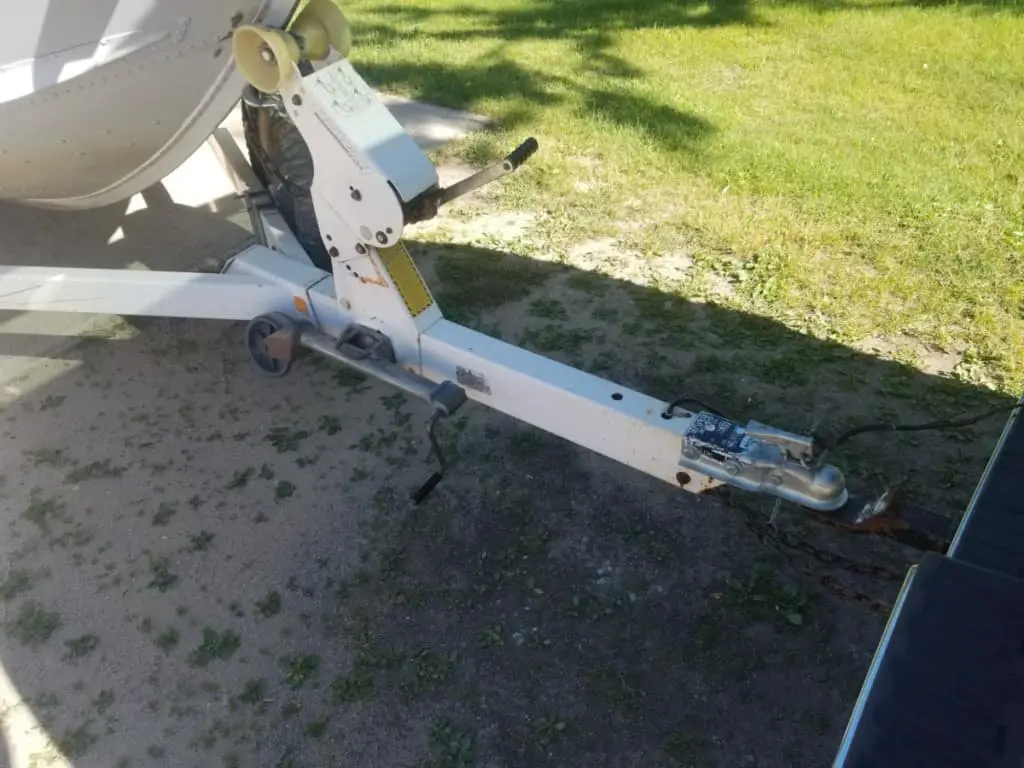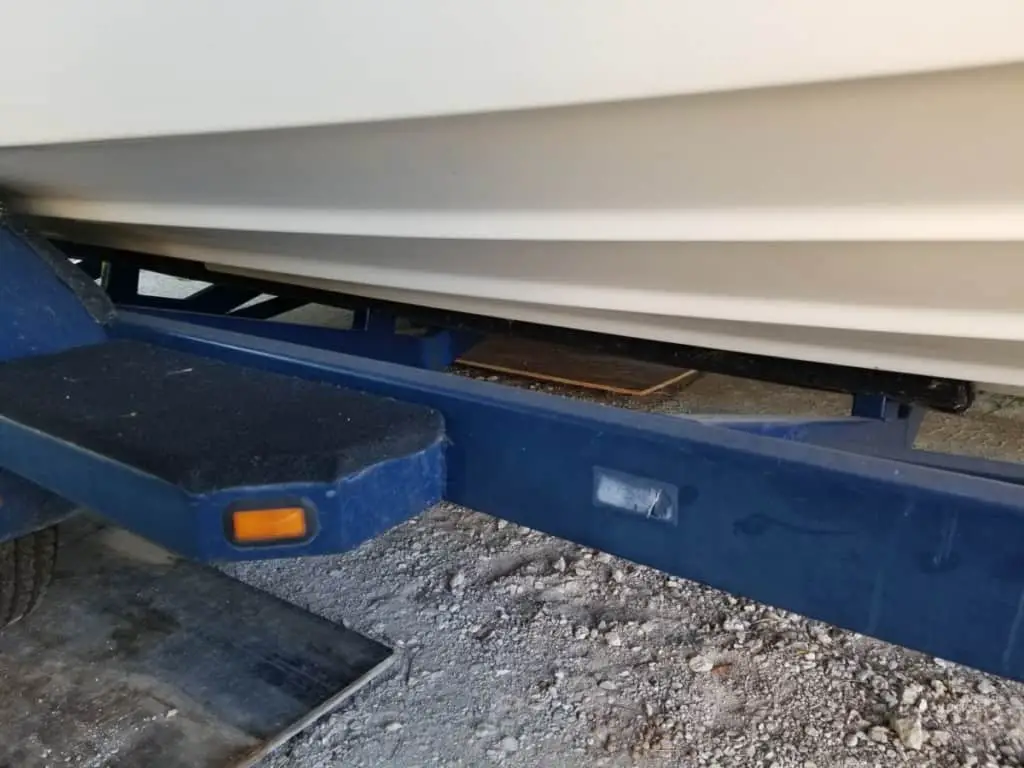I was curious about the weight of a Cuddy Cabin when my family first started thinking about upgrading from our bowrider because I needed to know what I would need to tow it. Would I need to upgrade my vehicle as well?
How much does a Cuddy Cabin weigh?
A cuddy cabin weighs, on average, about 150 lbs (68 kg) per foot of length when considering the dry-weight only (engine included, no trailer). Ranging in length from 18 to 25 feet, they can weigh anywhere from 2,700 to 3,750 lbs (1225-1700 kg).
There are, of course, outliers to this average estimation method.
Below, I’ll briefly cover my methodology for figuring out this number, share what I’ve learned about a few other points when deciding the total weight of a cuddy cabin for towing and the max towing capacity that your vehicle should have to successfully and safely transport your cuddy!
If you’d like to see how much most other boats weight, what trailer is required, and what vehicle is needed to tow them, you can check out my newer article here. ⇇
Cuddy Cabin Average Weight per Foot of Length
When I did my research, I took notes on the dry weights (motor included, no trailer) and lengths of 24 different TRUE Cuddy Cabins from 4 different brands.
When I added up the weight, I was at 69,028 lbs. The lengths were anywhere from 18’ up to just shy of 24’ and everything in between, and the weights were as low as 1,990 lbs to as high as 4,175 lbs.
Total length in feet was 466.583.
If we solve, 69,028 lbs/466.283’=147.95 lbs per foot on a Cuddy Cabin on average.
Cuddy Cabin Average Boat Weights Per Foot
| Length | Weight |
|---|---|
| 18' | 2,663 lbs |
| 19' | 2,811 lbs |
| 20' | 2,959 lbs |
| 21' | 3,106 lbs |
| 22' | 3,255 lbs |
| 23' | 3,403 lbs |
| 24' | 3,551 lbs |
I think it’s safe to say, that if you were looking to make a rough guess at the weight of a prospective boat you were looking to buy, multiplying the length in feet by 150 lbs would give you a good idea of what Cuddy Cabin weight you’re working with when deciding towing capacity.
What is “Dry Weight”?
Dry weight is the weight of the boat itself as it leaves the manufacturer. Naturally, I wondered if engines are included in the dry weight. Generally, the answer is yes.
All of the well-known brands that I looked at made a designation that the standard issue engine was included in the figures. Some would even tell you the dry weight and the dry weight + trailer which was convenient!
Things not covered in the dry weight include the crew, their personal effects, optional upgrades beyond standard features provided by the manufacturer, liquids (gasoline and water), gear (fishing, tubing, cooking, skiing, etc.).
When you find a boat that gets your attention, you should easily be able to find an original spec sheet that will tell you what you’re working with. If it’s a used boat and has attached accessories and upgrades, you’ll need to do some guesswork or take it to a
What is the Tongue Weight and How do I Calculate it?
Tongue weight is the downward force that the tongue of your trailer (where it connects to the hitch of your vehicle) places upon the hitch. Ideally, the downward force should be about 10-15% of the entire weight of the trailer and what it’s carrying.
Tongue weight is basically a measurement to figure out how the weight is distributed for towing to optimize balance while on the road.

If you have too little tongue weight, you risk fishtailing down the highway or lots of swaying back and forth. If you have too much downward force at the hitch, you’re going to find that steering will be much more difficult, your rear will sag down, and braking will not be as efficient.
There’s a method to figure out the tongue weight using some boards, a 4×4, a concrete paver, and a bathroom scale. This is not my video, but it is a very helpful demonstration that you can check out here to Youtube to get an idea of how it’s done. It is straight and to the point.
Finding an accurate tongue weight is important for not only your safety but the safety of everyone you come in contact with on the road. Setting up a makeshift weight station can be time-consuming. There’s actually a hitch out there built from aircraft aluminum and stainless steel that has a scale built right into it and gives you an instant reading with no guesswork or calculations. You can check out the 5-star reviews and price here on Amazon.
What do Gas and Water Weigh per Gallon?
Considering that an average Cuddy could have a gas tank anywhere from 30 to 60 gallons, we’re talking about an additional 189 to 378 lbs!
Most Cuddy Cabins will not store much freshwater, if they even store water at all. Most that I saw when researching would hold 3 to 6 gallons when the amenity was included. That would be about 25 to 50 lbs extra when towing.
How Much does a Cuddy Cabin Trailer Weigh?
When I was doing my research, I found that the weight of the trailer increased as the size of the boat increased which obviously makes sense. Typically, on the shorter boats in the 18-19 foot range, I saw that the trailers weighed about 800 to 900 lbs. As the size got up near 24 to 25 feet, the trailer weight jumped up to 1,400 lbs.
Weight is going to depend on the materials used (steel vs aluminum) and the number of axles, but I feel that 1,000 lbs is a solid benchmark to keep in mind when shopping around. It may be a little more, or a little less, but 1,000 lbs is a happy medium.

The other thing I found is that the advertised trailer weights by the manufacturer are not accurate in many cases and tend to be advertised on the lighter side. Many people who weighed their trailers found that the actual weight was 100 to 200 lbs more than advertised.
I’m not sure if the manufacturer includes only the frame of the trailer when weighing and excludes the tires, but it is a probably a good idea to keep that in mind if you’re really cutting it close with your method of towing.
How Much Towing Capacity Should I Have?
Generally, I would recommend having a towing capacity that is at least 20% greater than the total estimated weight of your cuddy, gear, accessories, liquids (gas and water), and trailer. Leaving that buffer allows for assurance that you won’t have any problems, and it greatly reduces the stress that you put on your vehicle’s engine.
For a more comprehensive article on towing a cuddy cabin, you can check out my article here.
With that being said, it’s also best to carefully calculate your total weights and add another 20% onto that estimate due to inevitable errors. Many of these major errors are a result of discrepancies between what a manufacturer says a boat or trailer weighs and the actual weight.
It is not uncommon to find that your boat weighs 10-20% more than the advertised amount, and for a trailer to weigh 100-200 lbs more than advertised.
If we consider a Cuddy on the high end with a dry weight of about 4,000 lbs, add on about 1,000 lbs of gear, food, ice, and accessories, 500 lbs of liquids (gas and water), and the trailer (1,400 lbs), we’re left with a total of 6,900 lbs.
Add 20% for error and our new total is 8,280 lbs.
If we add another 20% buffer for our vehicle’s max tow rating, we need one that can at least tow just shy of 10,000 lbs. If you want to bump that max tow rating up to 12,000 lbs (or more) to be safe and to put less wear on your engine, you’ll definitely be in a more comfortable territory.
THE 20% RULE:
AN ACCURATE TOTAL WEIGHT ASSESSMENT IS CRITICAL FOR SAFETY ON THE ROAD AND FOR THE PROTECTION OF YOUR TRUCK, TRAILER
AND BOAT.CAREFULLY ADD UP ALL OF THE WEIGHTS OF YOUR BOAT AND ITS CONTENTS (GEAR, BATTERIES, FUEL, WATER, ETC). MAKE SURE THE TRAILER YOU CHOOSE CAN HANDLE AT LEAST 20% MORE THAN THAT AMOUNT.
ADD THE ESTIMATED WEIGHT OF THE TRAILER ITSELF TO THE ESTIMATED WEIGHT OF THE BOAT AND ITS CONTENTS.
ADD 20% TO THE TOTAL (TRAILER + BOAT + CONTENTS) FOR A NEW FINAL TOTAL.
NOW, MAKE SURE YOUR TRUCK HAS A TOWING CAPACITY AT LEAST 20% MORE THAN THAT NEW FINAL TOTAL TO ENSURE THAT THERE WON’T AN ISSUE.
Related Questions:
How Much does a Cabin Cruiser Weigh?
Since I’m in the market more for a true Cuddy Cabin and not a Cabin Cruiser, I only had notes in my research from 8 different models from 3 different brands, all ranging from 25’ up to just over 30’. The total dry weight was 40,693 lbs (again, motor included, no trailer), and the total length was 185.666’.
40,693 pounds / 185.666 feet = 219.17 pounds per foot of a Cabin Cruiser.
Cabin Cruiser Boat Weight per Foot
| Length | Weight |
|---|---|
| 25' | 5,479 lbs |
| 26' | 5,698 lbs |
| 27' | 5,917 lbs |
| 28' | 6,136 lbs |
| 29' | 6,356 lbs |
| 30' | 6,575 lbs |
Again, this isn’t scientific, but it gives you of a rough guess when looking at a Cabin Cruiser from 25-30’ in length. I would round up to the next memorable number of 225 pounds per foot when guessing the weight of a Cabin Cruiser for towing.
